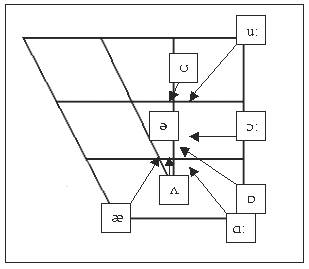Weak forms #1
When we talk about weak forms in the phonetics of English this regards a
series of words which have one pronunciation (strong) when isolated, and
another (weak) when not stressed within a phrase,
e.g.
from /frɒm/
The Man from Atlantis /ðə'mænfrəmət'læntɪs/
Weak forms are usually distinguished by a change in vowel quality from a
border position on the vowel quadrilateral to a central position. The
vowel in a weak form is usually the schwa (ə). Weak forms are pronounced
more quickly and at lower volume in comparison to the stressed syllables.
They are also not central to changes in intonation.

Fig. 1. The change of position of vowel production for the articulation of
weak forms.
There is a logical explanation behind the occurrence of weak forms: they
are present in words which are necessary to construct a phrase yet, at the
same time, do not communicate a large quantity of information, in other
words, they are not content words.
For example in the following phrase:
I went to the hotel and booked a room for two nights for my father and
his best friend
the most important words, those that are central to the message, can be
emphasised:
I went to the hotel and booked
a room for two nights
for my father and his best friend
if we eliminate the words that are not emphasised, can we still understand
the message?
went hotel booked room two nights father best friend
Perhaps it is difficult to be certain but it is possible to predict what
the missing words might be.
The words which we emphasised would bear the stress, while many of those
which we eliminated would become weak forms, simply because they are less
important in the conveyance of the message.
Look at the sentence in transcription:
/aɪˈwentəðə həʊˈtel ənˈbʊktəˈru:mfəˈtu:ˈnaɪtsfəmaɪˈfɑ:ðərənhɪzˈbestˈfrend/
You will notice that most of the unstressed words are pronounced with the
sound /ə/: prepositions such as to and for, articles a,
an and the, and the conjunction and. Auxiliary
verbs frequently have weak forms.
| << Back | Next >> |